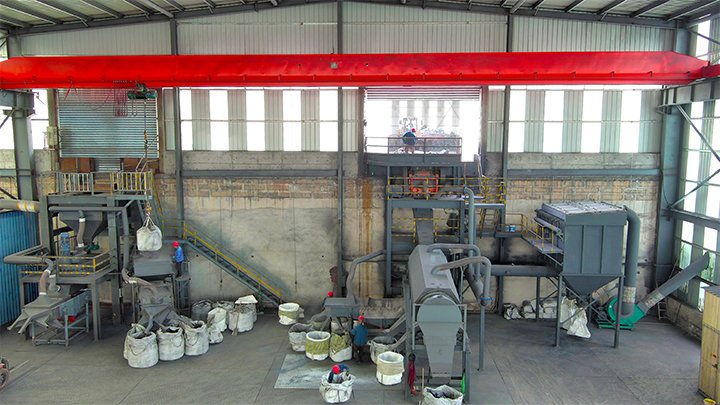Ferrosilicon (FeSi), an alloy made from iron and silicon, is widely used in various industries, particularly in steelmaking, aluminum production, and chemical manufacturing. Typically, ferrosilicon is produced as large natural blocks, which need to be processed into smaller, standardized particle sizes for practical use depending on the requirements of the end application.

The Ferrosilicon Processing Flow
- Raw Material Preparation: Ferrosilicon natural blocks are produced through the reduction of silica (SiO₂) and iron ore (Fe₂O₃) in electric arc furnaces. After the ferrosilicon is formed, it is typically in the form of large blocks ranging from tens to hundreds of millimeters in size. The first step in the processing of these blocks is to inspect and prepare the material. This includes sorting the blocks based on their size and purity to ensure that only high-quality raw materials proceed to the next stage of processing.
- Crushing and Initial Sizing: The large ferrosilicon blocks need to be crushed into smaller pieces. This step is crucial for breaking the blocks down into smaller, more manageable pieces. Depending on the desired final size, the material may undergo several rounds of crushing to reduce the block size closer to the target range.
- Screening and Grading: After the initial crushing, the ferrosilicon particles are screened to ensure they are the correct size. Vibrating screens or other types of sieving equipment are commonly used to separate the material into various size fractions. For example, particles might be sorted into ranges like 10-30mm, 30-50mm, and 50-100mm. The screening process ensures that only uniform particles, with minimal variation in size, move forward in the process.
- Packaging and Delivery: Once the ferrosilicon particles have been processed, they are packaged in bulk or in smaller bags depending on customer needs. The packaging is designed to protect the product during transport and handling. High-quality ferrosilicon is crucial for various industrial processes, so ensuring that the particles retain their integrity during delivery is vital. After packaging, the product is shipped to customers in the steel, aluminum, and other metallurgical industries.

Why Ferrosilicon Processing Matters
The process of converting natural ferrosilicon blocks into standardized particles is an essential step in the production of high-quality metal alloys. The particle size and consistency of ferrosilicon directly impact its performance in metallurgical applications, such as deoxidizing steel or producing alloys with specific properties. Whether for use in steelmaking, casting, or other industrial processes, the ability to deliver ferrosilicon in the right particle size is critical to optimizing production efficiency and ensuring product quality.
As industries continue to demand high-performance metals, the importance of precise ferrosilicon processing will only grow. Advances in crushing, screening, and refining technologies are helping manufacturers meet these evolving needs, ensuring that ferrosilicon continues to be a key player in the production of high-quality metals.
